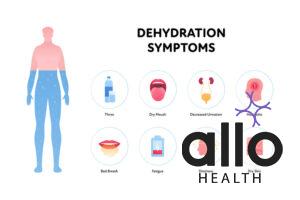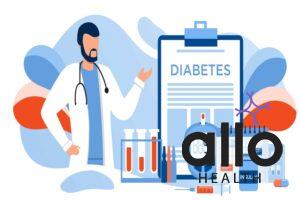How to Manage Dry Mouth During Sex

Allo Health is dedicated to personalized well-being, offering support and trusted information tailored to individual health goals. The platform emphasizes human-generated content, led by a distinguished medical team of experts, including physicians and sexual health specialists. Their commitment to credibility involves rigorous fact-checking, authoritative research, and continuous updates to ensure accurate, up-to-date information. Allo Health's unique approach goes beyond conventional platforms, providing expert-led insights and a continuous commitment to excellence, with user feedback playing a crucial role in shaping the platform's authoritative voice.

Welcome to my profile! I’m Dr Simran Shamanur, a dedicated and compassionate certified Sexologist with over 5 years of learning and experience in this field. I have treated over 1000 patients by helping them lead healthier, happier and more fulfilling lives by addressing their sexual health concerns. My approach is one of empathy, confidentiality and the right treatment for sexual concerns. I understand that discussing sexual health concerns can be sensitive and challenging. I provide a safe, non-judgemental and confidential environment where you can openly express your concerns and questions. Together, we will work to find personalised solutions to your specific needs.
Why This Was Upated?
Our experts continually monitor the health and wellness space, and we update our articles when new information became available.
Updated on 12 April, 2024
- Article was updated as part of our commitment to diversity, equity, and inclusion.

"The following blog article provides general information and insights on various topics. However, it is important to note that the information presented is not intended as professional advice in any specific field or area. The content of this blog is for general educational and informational purposes only.
Book consultation
The content should not be interpreted as endorsement, recommendation, or guarantee of any product, service, or information mentioned. Readers are solely responsible for the decisions and actions they take based on the information provided in this blog. It is essential to exercise individual judgment, critical thinking, and personal responsibility when applying or implementing any information or suggestions discussed in the blog."
Sex is a beautiful experience that can bring pleasure and intimacy to any relationship. However, dry mouth during sex can make this experience uncomfortable and sometimes even painful. A dry mouth is not only caused by dehydration but can also be due to underlying medical conditions or medication. The good news is that there are ways to manage dry mouth during sex and enjoy the experience to the fullest.
What Causes Dry Mouth During Sex?
Dry mouth during sex can result from dehydration, medication use, and medical conditions like Sjogren’s syndrome and diabetes. Hormonal shifts, like those during menopause, may also play a role, impacting vaginal moisture and overall comfort. Smoking and alcohol intake can worsen dry mouth due to dehydration. Let’s take a closer look at the causes:
- Medical Conditions: Several conditions can contribute to dry mouth during sexual activity. Sjogren’s syndrome, an autoimmune disease, primarily affects moisture-producing glands, leading to decreased production of saliva. Additionally, diabetes can affect saliva composition, resulting in dryness. These conditions disrupt the natural lubrication process, causing discomfort during sex.
- Performance Anxiety: Psychological factors play a significant role in sexual experiences. Performance anxiety, often rooted in fear of judgment or pressure to perform, triggers the body’s stress response. This response can lead to reduced saliva production, resulting in dry mouth and discomfort during intimate moments.
- Dehydration: Proper hydration is essential for bodily functions, including saliva production. When the body lacks adequate fluids, saliva volume decreases, causing dryness not only in the mouth but also in other areas, such as genitals. Dehydration negatively impacts the body’s ability to maintain moisture, affecting sexual comfort.

- Medications: Various medications, including antihistamines, antidepressants, and blood pressure drugs, can have a drying effect as a side effect. These medications can interfere with saliva secretion and alter its composition, contributing to dry mouth during sexual activity.
- Stress and Anxiety: Both chronic stress and acute anxiety disorders can hinder the body’s natural processes, including saliva production. High-stress levels can disrupt the autonomic nervous system, which controls involuntary functions like saliva secretion. Anxiety can also divert blood flow away from salivary glands, reducing moisture in the mouth and leading to dryness.
- Hormonal Changes: Hormones play a crucial role in many bodily functions, including rate of saliva production. Hormonal changes associated with menopause can result in decreased saliva flow. Estrogen, a hormone important for maintaining mucosal tissues, can decline during menopause, affecting the moisture levels in the mouth and contributing to dry mouth during sexual activity.
- Diabetes: Diabetes can affect saliva composition, leading to dryness in the mouth and other areas. Fluctuations in blood sugar levels can disrupt the body’s ability to maintain proper hydration.

- Radiation Therapy: Cancer treatments, including radiation therapy to the head and neck area, can damage salivary glands, leading to decreased saliva production and dry mouth.
- Infections: Certain infections, such as HIV/AIDS, can affect salivary gland function and contribute to dry mouth.
- Tobacco and Alcohol: Smoking and excessive alcohol consumption can contribute to dry mouth.
- Oral Thrush: Oral thrush, a fungal infection caused by Candida yeast, can affect the salivary glands and hinder their normal function. The presence of the infection can lead to inflammation and reduced saliva production, resulting in dry mouth. This condition is more common in individuals with weakened immune systems, such as those with diabetes or undergoing chemotherapy.
- Nerve Damage: Nerves play a crucial role in signaling the salivary glands to produce saliva. Any trauma, surgery, or medical condition that damages these nerves can disrupt the communication process and lead to decreased saliva production, ultimately causing dry mouth.
- Cystic Fibrosis: Cystic fibrosis is a genetic disorder that affects various organs, including the salivary glands. In this condition, the body produces thick and sticky mucus that can block the ducts of the salivary glands. As a result, saliva flow is reduced, leading to dry mouth and an increased risk of dental problems.
- Mouth Breathing: Breathing predominantly through the mouth, rather than the nose, can dry out oral tissues and reduce saliva production. Chronic mouth breathing can be due to nasal congestion, allergies, or anatomical factors, and it can contribute to dry mouth over time.
Symptoms of Dry Mouth During Sex
A dry mouth during sex can lead to various uncomfortable symptoms that can impact your overall sexual experience and oral health. Some common symptoms of dry mouth during sexual activity include:
- Bad Breath: Reduced saliva flow can result in bad breath (halitosis) as bacteria thrive in a dry environment, leading to an unpleasant odor.
- Dry Throat: Dry mouth can contribute to a dry and scratchy throat, causing discomfort and irritation.
- Mouth Sores: The lack of sufficient saliva can make the oral tissues more vulnerable, increasing the risk of developing mouth sores.
- Burning Sensation: A burning or tingling sensation in the mouth may occur due to the lack of moisture and irritation of oral tissues.
- Trouble Tasting: Saliva plays a key role in carrying taste molecules to taste buds. Dry mouth can impair your ability to taste and fully enjoy the flavors during intimate moments.
- Dry Tongue: The tongue can become dry and uncomfortable, affecting your ability to move it comfortably and engage in pleasurable activities.
- Cracking of Lips: Insufficient saliva can lead to dry and cracked lips, causing discomfort and potentially affecting the aesthetics of the experience.
- Tongue Pain: A dry tongue can lead to pain and discomfort, making it less enjoyable to engage in activities that involve the tongue.
- Ulcers: Dry oral tissues are more prone to developing ulcers, which can be painful and hinder your ability to fully enjoy the experience.
- Gum Disease: Reduced saliva flow can contribute to a buildup of bacteria and plaque, increasing the risk of gum disease.
- Sore Throat: Dry mouth can contribute to a sore throat, making it uncomfortable to engage in activities that involve speaking or vocalizing.

Experiencing these symptoms during sexual activity due to dry mouth can impact your comfort, pleasure, and overall well-being. It’s important to address dry mouth to enhance your sexual experience and maintain good oral health. If dry mouth persists, consider seeking advice from a healthcare professional or dentist to identify the underlying causes and explore effective management strategies.
How Can Dry Mouth Impact Your Sex Life?
Dry mouth during sex can have significant impacts on your sexual experience and overall well-being. It goes beyond mere discomfort, potentially leading to various challenges that can affect both physical and emotional aspects of intimacy:
- Increased Risk of Infections: Dry mouth creates an environment conducive to infections, including conditions like thrush and sexually transmitted infections (STIs). The lack of sufficient saliva hinders its natural antimicrobial properties, making it easier for harmful microorganisms to thrive and cause infections.
- Discomfort and Pain: Engaging in sexual activity with a dry mouth can lead to discomfort and pain, making the experience less pleasurable and even painful. This physical discomfort can disrupt the natural flow of intimacy and create a barrier to fully enjoying the moment.
- Stress and Discomfort: Dry mouth can introduce an unwelcome element of stress and discomfort into your sexual encounters. The focus on managing the dryness may divert attention away from the intimate connection you share with your partner.
- Reduced Sexual Satisfaction: Dry mouth may lead to reduced sexual satisfaction for both partners. The discomfort and distraction can inhibit arousal and pleasure, affecting the overall quality of the experience.
- Self-Esteem Issues: Individuals experiencing dry mouth during sex may develop self-esteem issues due to concerns about their desirability and attractiveness to their partner. This can lead to feelings of inadequacy and insecurity.
Treatment for Dry Mouth During Sex
The treatment for dry mouth during sex includes:
- Chew Sugar-Free Gum: Chewing sugarless gum can stimulate saliva flow and help keep your mouth moist which leads to fresh breath during sexual activity.
- Limit Caffeine Intake: Cutting back on caffeine can reduce dehydration and the risk of dry mouth during sex.
- Avoid Tobacco: Tobacco products can contribute to dry mouth, so quitting or avoiding them can improve your oral health.
- Stay Hydrated: Drinking water and staying hydrated throughout the day can prevent dry mouth during sex.
- Use Xylitol Mouthwash: Mouthwash containing xylitol can help promote saliva production and alleviate dry mouth symptoms.
- Prevent Mouth Breathing: Breathing through your nose instead of your mouth can reduce dry mouth by preserving saliva.
- Try a Cool-Mist Humidifier: Using a cool-mist humidifier in your bedroom can improve air moisture and reduce dry mouth.
- Use Artificial Saliva: Artificial saliva products can provide relief by mimicking natural saliva and moistening your mouth.
- Moisturizing Mouth Lozenges: Using lozenges specifically designed for dry mouth can help maintain moisture during sexual activity.
Home Remedies for Dry Mouth
Stay Hydrated: Drinking plenty of water before and during sex is key to preventing dry mouth. Avoid alcohol, which can dehydrate you. Opt for coconut water, herbal teas, and fruit juices to replenish fluids and provide essential nutrients.
Healthy Diet: Eat nutrient-rich foods like leafy greens, nuts, and whole grains to boost energy and enhance blood flow, improving sexual performance for both partners.
How to Deal with Anxiety Related to Dry Mouth During Sex
Anxiety and stress can worsen dry mouth during sex. If you’re experiencing anxiety related to dry mouth, try practicing relaxation techniques such as deep breathing exercises, meditation, or yoga.
Seeking the help of a therapist can also help to address underlying psychological factors contributing to anxiety.
In addition to these techniques, it may be helpful to communicate with your partner about your concerns. Letting them know about your anxiety related to dry mouth can help to alleviate some of the pressure you may be feeling.
You can also try incorporating lubricants or saliva substitutes to help with dryness. Remember, it’s important to prioritize your own comfort and pleasure during sexual activity.
Frequently Asked Questions:
Q. Why do I experience dry mouth during sex?
A. Dry mouth during sex can result from various factors, including dehydration, performance anxiety, autoimmune diseases, medication side effects, and certain medical conditions. It’s essential to identify the underlying cause for appropriate management.
Q. How does dehydration contribute to dry mouth during sexual activity?
A. Dehydration can hinder saliva production, leading to dry mouth. Staying hydrated by drinking water and avoiding alcohol before sex can help reduce the risk of dry mouth.
Q. Can anxiety cause dry mouth during sex?
A. Yes, anxiety and stress can lead to decreased saliva production, resulting in dry mouth. Relaxation techniques, open communication with your partner, and addressing anxiety may help alleviate this issue.
Q. What are the potential consequences of dry mouth during sex?
A. Dry mouth during sexual activity can cause discomfort, pain, and even increase the risk of infections. It might also impact sexual satisfaction and self-esteem. Staying hydrated, and addressing underlying causes can help manage and prevent dry mouth during sex.






































